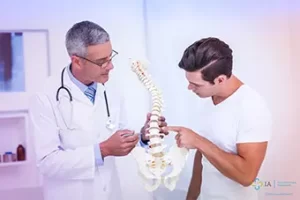 Orthopedic consultations and surgeons can be intimidating. You’re already nervous. There are big decisions to be made about your care. How do you know if what is being recommended for your treatment is the right option?
Orthopedic consultations and surgeons can be intimidating. You’re already nervous. There are big decisions to be made about your care. How do you know if what is being recommended for your treatment is the right option?
You should not be afraid to ask difficult questions and should be comfortable with your options to move forward with the recommended surgery. Do you feel that you have been given enough information to make an informed decision about your surgical options?
At a professional practice, patients are shown their MRI’s and receive a thorough explanation of the recommendation to make sure you are able to make an informed decision as a full partner in your surgical care. Most clinicians are happy to provide second and in some cases…third and fourth opinions. They should not move forward until you fully understand your options and are completely comfortable with your decision.
Surgical options are big decisions. You may want to get a second opinion to be sure you are making the right decision, so we’ve asked our orthopedic surgeons here at Complete Care about situations where a second opinion may be important. Here are 4 situations that our surgeons feel are important enough for you to get a second surgical opinion to ensure you are getting the most information possible to make the best decision for your surgical care.
Spine issues are just one example of conditions that can leave patients confused about whether they need surgery. A second opinion is most useful when a patient is hesitant or scared to move forward with the recommendation. Often our patients are put at ease knowing the second doctor put significant time into reviewing MRIs, previous treatment plans, and has explored their case beyond just the physical exam. The extra time is valuable in making sure the patient is comfortable with moving forward with the treatment they medically require.
The diagnosis of shoulder injuries is commonly delayed due to lack of awareness of the potential association between whiplash and Subacromial Impingement and the assumption that all shoulder symptoms emanate from the neck. According to a study on Subacromial Impingement in patients with whiplash, only 27% of patients were diagnosed properly with subacromial impingement syndrome. Most were diagnosed with radicular pain to the shoulder and the shoulder was not considered as a separate complaint.
In the past, patients with contained disc herniations have been treated with conservative care including rest, medications, injections and/or physical therapy. Unfortunately, this does not always provide relief. These patients who did not respond to conservative care were forced to live with the symptoms. At Complete Care, this may not be the case. Disc-FX® Elliquence provides an option for those people who have failed conservative care and are not yet ready for major surgery.
Vertebral endplates can be a significant source of low back pain. Modic changes and associated endplate damage could lead to vertebrogenic pain. Relievant could be an excellent surgical alternative for these patients.
Those are 4 key situations that the surgeons of Complete Care recommend a patient get a second surgical opinion. If you’re looking for a second opinion, give our orthopedic team a call today at (844) 699-2273 to get started.
The Content is not intended to be a substitute for professional medical advice, diagnosis, or treatment. Always seek the advice of your physician or other qualified health provider with any questions you may have regarding a medical condition.
The information provided on this website does not, and is not intended to, constitute legal advice; instead, all information, content, and materials available on this site are for general informational purposes only. Information on this website may not constitute the most up-to-date legal or other information. This website contains links to other third-party websites. Such links are only for the convenience of the reader, user or browser.